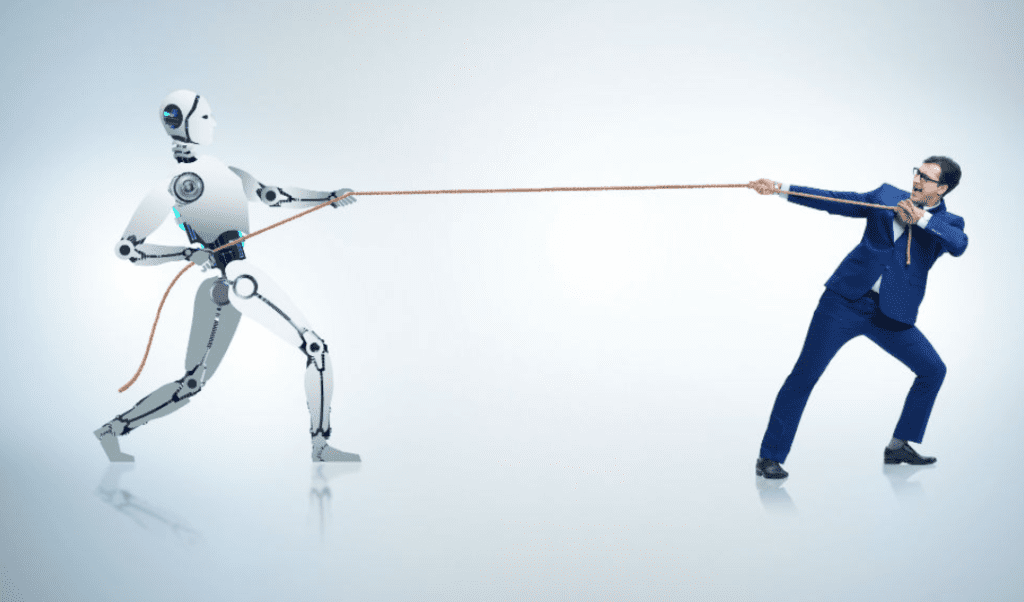Introduction
Artificial Intelligence (AI) has become one of the most transformative technologies of our time. It has infiltrated almost every aspect of our lives, from virtual assistants on our smartphones to self-driving cars and predictive healthcare. With AI’s rapid advancements, the question of whether it will replace human workers looms large. Will the rise of AI lead to mass unemployment, or can humans coexist and collaborate with AI in a harmonious way? In this blog, we’ll explore the complex relationship between AI and human workers, looking at both the potential benefits and challenges that lie ahead.
Rise of Artificial Intelligence
Before delving into the topic, it’s essential to understand the remarkable progress AI has made in recent years. AI encompasses various technologies, including machine learning, deep learning, natural language processing, and robotics. These technologies enable machines to perform tasks that traditionally required human intelligence, such as recognizing patterns, making decisions, and solving complex problems.
One of the defining characteristics of AI is its ability to learn from data. Machine learning algorithms, for instance, can process vast amounts of data and discover patterns and insights that are beyond human capacity. This learning capability has allowed AI to excel in a wide range of applications, including:
1. Automation
AI has significantly impacted manufacturing, logistics, and other industries by automating repetitive and labor-intensive tasks. Robots and robotic systems are employed in assembly lines, warehouses, and even surgery rooms, enhancing productivity and precision.
2. Data Analysis
AI-driven data analytics has revolutionized various sectors, from finance to healthcare. AI algorithms can quickly process and analyze large datasets, providing valuable insights for decision-making.
3. Customer Service
Chat bots and virtual assistants powered by AI have become commonplace in customer service, providing efficient responses and reducing the need for human intervention.
4. Predictive Maintenance
In the industrial sector, AI is used to predict when equipment needs maintenance, reducing downtime and costs.
5. Healthcare
AI is helping diagnose diseases, personalize treatment plans, and predict patient outcomes, all of which contribute to improved healthcare.
Fear of Automation
With these advancements, there’s a growing concern that AI and automation will lead to the displacement of human workers. This fear is not new; throughout history, technological advancements have often been met with apprehension. The difference with AI, however, lies in its potential to automate not only manual labor but also cognitive tasks that were once thought to be the exclusive domain of humans.
AI’s capabilities extend beyond just automating repetitive tasks; it can also perform complex decision-making and problem-solving. This leads to a legitimate question: will AI replace humans in the workforce entirely?
Dual Impact of AI
The impact of AI on the job market is two-fold, and it’s essential to examine both sides of the coin.
Potential for Job Displacement:
- Automation of Routine Tasks: AI can efficiently handle routine and repetitive tasks. This includes jobs in manufacturing, data entry, and even some administrative roles. As a result, there’s a risk of job displacement in these areas.
- Efficiency Improvements: AI can optimize operations in various sectors, potentially reducing the need for human workers. For example, in agriculture, automated drones and robots can monitor and manage crops, reducing the need for manual labor.
- Evolving Job Roles: As AI evolves, some job roles might undergo significant changes. While humans may still be needed, they may require new skills to work alongside AI effectively.
Creation of New Jobs:
- AI Development and Maintenance: The growth of AI technology itself creates job opportunities. These include roles in AI research, software development, and AI system maintenance.
- AI-Assisted Jobs: Many jobs will evolve to incorporate AI as a tool rather than a replacement. For instance, doctors can use AI for diagnostic assistance, but the human touch in patient care remains irreplaceable.
- Human-AI Collaboration: In many sectors, humans and AI can complement each other’s strengths. This collaboration can enhance productivity and create new job roles.
Human Skills that AI Can’t Replicate
While AI has made impressive strides, there are several areas where human workers still hold a significant advantage:
1. Emotional Intelligence
AI lacks the ability to understand and respond to human emotions effectively. Jobs that require empathy and emotional connection, such as counseling, care giving, and certain aspects of customer service, are likely to remain in human hands.
2. Creativity
AI can generate content and art, but it lacks the genuine creativity that humans possess. Creative fields like writing, design, music, and innovation will continue to depend on human ingenuity.
3. Complex Decision-Making
AI can process vast amounts of data, but it struggles with complex, non-linear, and context-dependent decision-making. Professions like law, where judgment and interpretation play a significant role, will still require human expertise.
4. Ethics and Morality
AI doesn’t have a moral compass. Decisions with ethical and moral implications, such as those in healthcare, law enforcement, and governance, require human involvement.
5. Communication and Relationship Building
Building trust and strong relationships with clients, customers, and colleagues is a fundamentally human skill. This makes jobs in sales, marketing, and leadership less susceptible to AI replacement.
Preparing for the Future
Given the complex landscape of AI’s impact on the workforce, it’s crucial to prepare for the future. Here are some key considerations:
1. Embrace Lifelong Learning
In a world where jobs and industries are rapidly evolving, individuals must adopt a mindset of continuous learning. Developing new skills and staying updated with technology is essential to remain relevant in the job market.
2. Nurture Human Skills
As AI takes over routine tasks, individuals can focus on honing skills that are uniquely human, such as creativity, critical thinking, and emotional intelligence.
3. Promote Education and Training
Educational institutions and organizations should adapt their curricula and training programs to equip individuals with the skills needed to work alongside AI effectively.
4. Embrace Human-AI Collaboration
Companies should explore ways to integrate AI into their operations, fostering a culture of collaboration between humans and machines.
5. Address Ethical Concerns
As AI becomes more integrated into society, there are ethical considerations to address, including issues related to bias, privacy, and accountability. It’s crucial to establish regulations and guidelines to ensure responsible AI use.
6. Job Transition Support
Governments and businesses should provide support for workers who face job displacement due to automation, offering retraining and job transition programs.
Conclusion
The relationship between AI and human workers is not a simple binary of replacement or coexistence. It’s a dynamic and evolving landscape where AI can both displace certain jobs and create new opportunities. While AI is excellent at automating routine tasks and data-driven processes, humans possess unique qualities such as emotional intelligence, creativity, and ethical decision-making that are difficult to replicate.
As we move forward into an AI-driven future, it’s essential to adapt, re-skill, and embrace the possibilities of human-AI collaboration. By doing so, we can harness the power of AI to enhance productivity, solve complex problems, and improve our quality of life while still preserving the irreplaceable role of humans in our workforce and society. The key lies in finding the balance between the benefits of AI and the preservation of our distinctly human qualities.






6,794 responses
Профессиональная помощь нарколога на дому в владимире – это важный шаг для тех‚ кто испытывает проблемы с алкоголем. Наркологические услуги‚ такие как помощь при алкогольном запое‚ позволяют людям эффективно и быстро прервать эпизод запойного пьянства. Выезд специалиста гарантирует конфиденциальность лечения и медицинскую помощь в комфортной обстановке‚ что особенно важно для пациентов‚ стремящихся сохранить свою конфиденциальность. Во время консультации нарколога осуществляется снятие абстиненции‚ что способствует пациенту восстановить здоровье. Методы кодирования и психотерапия при алкогольной зависимости являются неотъемлемой частью в лечении данной проблемы. Реабилитация пациентов предполагает поддержку близких‚ что способствует успешному выздоровлению. Не затягивайте с решением вашей проблемы; вызовите нарколога на дом‚ чтобы положить конец своей зависимости!
Помощь родных является важной ролью в реабилитации после запоя. Поговорите с ними свои планы и попросите о поддержке. Группы поддержки и обращение к специалистов представляют собой полезным ресурсом. Не забывайте о профилактике срывов: советы по жизни без алкоголя и самопомощь при алкоголизме помогут избежать возврата к старым привычкам. вывод из запоя
Инфузионная терапия после запоя — это важный шаг на пути к нормализации состояния. В большинстве случаев после интенсивного потребления спиртного возникают симптомы похмелья: мигрень, рвота, состояние слабости. В этом случае требуется очистка организма и улучшение работы печени.Инфузионная терапия способствует снять интоксикацию и облегчить состояние пациента. Борьба с алкогольной зависимостью должно обеспечивать медицинское сопровождение и реабилитацию. Комплексный подход может значительно снизить последствия запойного периода.На сайте vivod-iz-zapoya-vladimir027.ru можно найти информацию о профессиональной помощи, реабилитационных программах и способы борьбы с алкоголизмом. Берегите свое здоровье!
Наркологическая скорая помощь на дому – это неотъемлемая часть лечения зависимостей‚ который обеспечивает экстренную помощь при алкоголизме и зависимости от наркотиков. Служба наркологической помощи на выезд оказывает профессиональную помощь зависимым‚ включая очищение организма от наркотиков и кризисную интервенцию. На сайте vivod-iz-zapoya-vladimir026.ru можно получить консультации по наркологии‚ ознакомиться с методами лечения наркомании и восстановлении на дому. Анонимное лечение наркоманов позволяет сохранить конфиденциальность. Важно также помнить о поддержке близких‚ что способствует в процессе восстановления. Программа восстановления после зависимости включает меры по предотвращению рецидивов и психологическую поддержку‚ что помогает успешному возвращению к обычной жизни.
Алкоголизм у женщин является серьезной проблемой, требующей особого подхода к лечению. В владимире специализированная клиника предлагает необходимую помощь для выхода из запоя, что особенно важно для женщин, которые нередко сталкиваются с обществом, осуждающим их проблему. Алкогольная зависимость у женщин может развиваться быстрее, чем у мужчин, и проявляется особенными признаками, такими как депрессия и тревожность.Процесс лечения зависимости от алкоголя включает detox программу и медицинские методы лечения, а также психотерапию при алкоголизме. Важно позаботиться о поддержке со стороны близких и привлечение к группам поддержки, что позволяет создать безопасную среду для восстановления. Процесс реабилитации зависимых в владимире акцентирует внимание на социальной адаптации, что особенно важно для женщин, оказавшихся в такой ситуации. экстренный вывод из запоя владимир Предотвращение зависимости и своевременное обращение за помощью — ключевые факторы в борьбе с алкоголизмом. Комплексное лечение к процессу восстановления обеспечит эффективное выздоровление и возвращение к нормальной жизни.